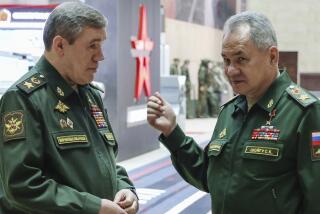Communist Party Survival at Stake in Russian Trial
- Share via
MOSCOW — Russia’s leadership on Friday unveiled its strategy to finish off the formerly all-powerful Communist Party once and for all at an impending trial deemed so critical that President Boris N. Yeltsin has warned that it could lead to civil war.
The key, top officials said, will be to use the Communist Party’s own words and rules against it, showing that Yeltsin was right to ban it last November because it acted as a supreme government rather than a mere political party.
Yeltsin’s defenders are “armed to the maximum” with arguments for the trial, which is to begin Tuesday in the Russian Constitutional Court, State Secretary Gennady Burbulis declared.
The trial itself--the result of a suit brought against Yeltsin by pro-Communist lawmakers--is actually intended to address only two narrow issues: whether Yeltsin’s ban on the party was constitutional, and whether the party itself is unconstitutional in nature and thus has no right to exist.
But the case’s implications are so broad that it has already turned into political dynamite.
If the court strikes down Yeltsin’s decree, it could badly damage his already shaky standing, hurt his efforts at reform and give party stalwarts a basis for reclaiming the vast holdings he confiscated.
On the other hand, if the trial goes his way, Yeltsin could deliver a stunning blow to his neo-Bolshevik opposition and bolster his authority.
Adding extra drama is the prospect that testimony could dredge up all kinds of dirt from the Communist past--including allegations against former Soviet President Mikhail S. Gorbachev, the party’s general secretary from 1985 until just after last August’s coup attempt.
Yeltsin warned in an interview published Friday that in the coming days, “the fate of Russia depends not so much on the president as on the Constitutional Court.
“Any support of the Communists can give them an extra ace and activate their destructive activities, which could drive us into civil war,” the Russian president told the daily newspaper Komsomolskaya Pravda in an unusually alarmist tone.
Similar warnings have mounted recently about what has been dubbed “the red-brown threat,” an evolving coalition of Communists and ultranationalists united by their opposition to Yeltsin.
As Russia moves into the most painful phase of its economic reforms, with major factories beginning to close down and mass unemployment spreading, nostalgia is swelling for the good old days when the Communist Party’s ruling Politburo maintained tight order.
Burbulis, who is considered Yeltsin’s main political strategist, said, “There has been considerable alarm about the consolidation of revanchist forces, and they are regrouping in conditions of a certain weakness of Russia’s government structures.”
The Communist leaders and lawmakers who plan to go to court against Yeltsin did not look very threatening, however, at their own news conference Thursday. They complained that all their party property had been confiscated, leaving them without even the money to fund their own defense, and that they had been forced into unwanted retirement.
A preview of their arguments focused on claims that Yeltsin exceeded his powers as president when he banned the Communist Party and accusations that he was trying to turn the Constitutional Court’s proceedings into a political show trial.
“This opens up a process of witch-hunting and the suppression of independent thinking, opening the way to an anti-democratic dictatorship,” they said in a joint appeal.
Vladimir Ivashko, the Ukrainian who served as second-in-command of the Soviet Communist Party when Gorbachev was still its general secretary, is expected to argue the party’s case.
Gorbachev himself has refused outright to testify, saying the trial will only serve to deepen the rifts in Russian society, and he appears to have gained the court’s permission not to appear.
Sergei Shakhrai, Yeltsin’s top legal adviser, said researchers have assembled 36 tomes of material from secret party archives to bolster the government’s case. He and other officials have already leaked word of documents proving that party leaders supported terrorism and squandered state funds.
Yeltsin lawyer Mikhail Fedotov said the government had recently calculated that from 1981 to 1991, about $755 million in state funds went to support the Communist Party, while less than one-quarter of that went to education.
Asked whether they have evidence of any financial crimes by Gorbachev and whether they plan in general to bring any criminal charges against the former Soviet president, Yeltsin’s defense team repeatedly dodged the question, implying that it was possible but not likely to come at Tuesday’s trial.
“We would like to find a fine balance,” Burbulis said, “between preserving and ensuring civil peace in Russia and, on the other hand, imposing a legal judgment on our entire history.”
Still, the Russian officials emphasized that they have no intent of launching anything like the Nazi war-crime trials at Nuremberg following the fall of Germany’s Third Reich.
“The Constitutional Court is unlike the Nuremberg trial,” Fedotov said. “ It doesn’t issue sentences for anyone. It can’t hang anyone. We’re not even talking about that.”
More to Read
Sign up for Essential California
The most important California stories and recommendations in your inbox every morning.
You may occasionally receive promotional content from the Los Angeles Times.













